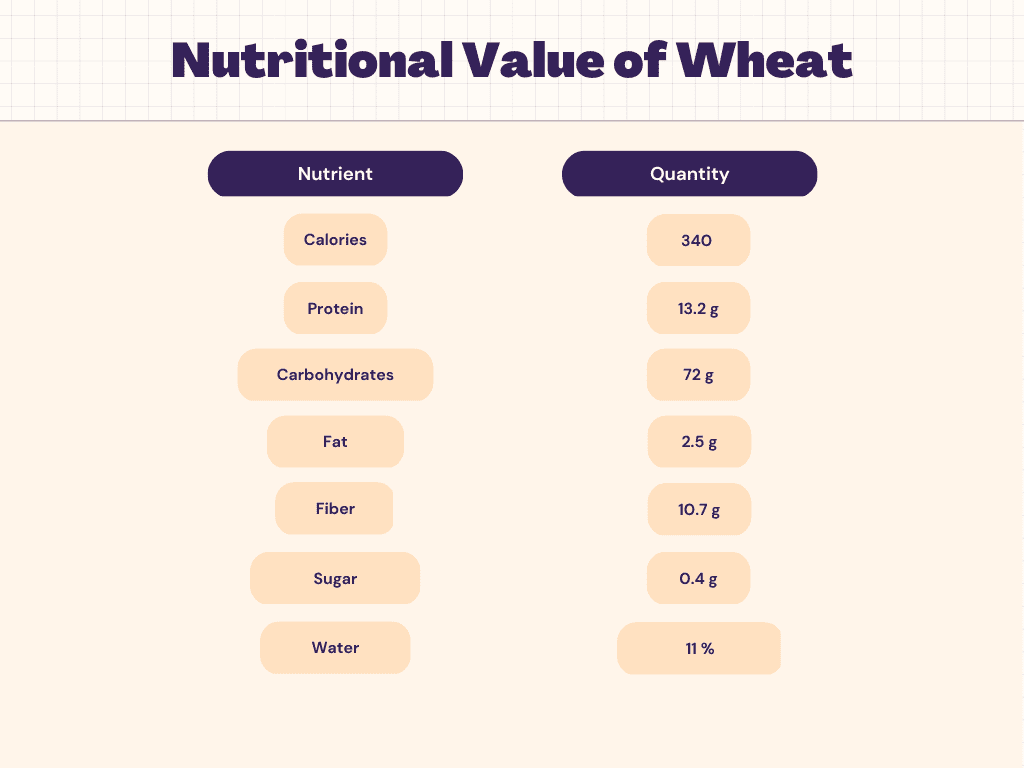One of the most popular cereal grains consumed worldwide is wheat. It derives from Triticum, a grass grown in various variants all over the world. The main species is bread wheat, often known as common wheat. Other species that are related to Khorasan wheat include durum, spelt, emmer, and einkorn. The two types of flour are essential to baked foods like bread. Semolina, bulgur, couscous, pasta, noodles, and other wheat-based dishes are also available. Gluten, a protein found in wheat, is incredibly contentious since it can in some people induce an adverse immunological reaction. Whole-grain wheat, however, can be a great source of numerous antioxidants, vitamins, minerals, and fiber for persons who can stomach it.
Nutritional Value of Wheat
Nutritional Facts of Wheat
Carbs
In the kingdom of plants, starch predominates; it makes up more than 90% of the total carbohydrates in wheat.
Starch’s impact on blood sugar levels is primarily determined by how easily it can be digested.
High digestibility can have negative impacts on health, especially for those who have diabetes, by causing an unhealthful blood sugar increase after eating.
Protein
7–22% of the dry weight of wheat is made up of proteins. Up to 80% of the total protein composition is made up of the big protein family known as gluten. It is in charge of giving wheat dough its distinctive elasticity and stickiness and qualities that make it so useful in breadmaking.
Health Benefits Of Wheat
- Controls Obesity – Although wheat is recognized for reducing obesity, women benefit from this effect much more than men do. Regularly consuming whole wheat products can benefit patients with obesity and can result in significant weight loss. Check our Weight Loss Plans.
- Prevents Diabetes – Type two diabetes is a chronic disease that may be very deadly if it is not properly managed, but it is also a condition that can be reversed if one is more mindful of their diet. Magnesium is one of the nutrients that is abundant in wheat. Check our Diabetes Plans.
- Protects against Coronary diseases – Whole wheat contains a lot of plant lignans, a phytonutrient which after ingestion, they are changed into mammalian lignans in the intestines by the body’s sensitive flora. Enterolactone, one of the lignans contained in wheat, guards the body against diseases that depend on hormones, like breast cancer.
- Helps in reduction of chronic inflammation – Any inflammation that has persisted for a few months is essentially considered chronic inflammation.
Vitamins & Minerals in Wheat
- Selenium – Your body uses this trace element for a variety of vital processes.
- Manganese – Manganese, which is abundant in whole grains, legumes, fruits and vegetables.
- Phosphorus – This dietary mineral is crucial for the upkeep and development of bodily tissues.
- Copper – Copper, a crucial trace element, is frequently under-consumed in Western diets.
- Folate – Folate, a B vitamin, is often referred to as folic acid or vitamin B9.
The Bottom Line
Wheat’s primary nutrient is carbohydrate. However, this grain contains a lot of fiber, which might help with digestion. Gluten makes up the majority of its protein. Selenium, manganese, phosphorus, copper, folate and other vitamins and minerals may be reasonably present in whole wheat. Lignans are just a couple of the beneficial antioxidants that wheat bran, a component of whole wheat, may contain. Notably, these substances are absent from white flour and other processed wheat products.
FAQs
How much Wheat can I eat in a day?
5 to 8 ounces of grains per day, 3 to 6 of which should be whole grains, have been advised by experts.
Should I eat Wheat before or after exercise?
Eat a slice of whole wheat bread or a banana with some peanut or almond butter before working out for a great combination of carbs and protein. You’ll get energy from the carbohydrates, while protein promotes muscular building.
What are the benefits of Wheat?
- Helps with gut health
- Prevention of colon cancer
- Keep blood sugar levels under control
- Decreased cholesterol
- Reduce your risk of developing colorectal cancer
- Make bowel movements better
- You’ll be satisfied with fewer calories since you’ll feel fuller for longer.
What is the best time to eat Wheat?
The best time to eat wheat is in the fall and winter, when the digestive system is at its strongest, once daily in the middle of the day.










